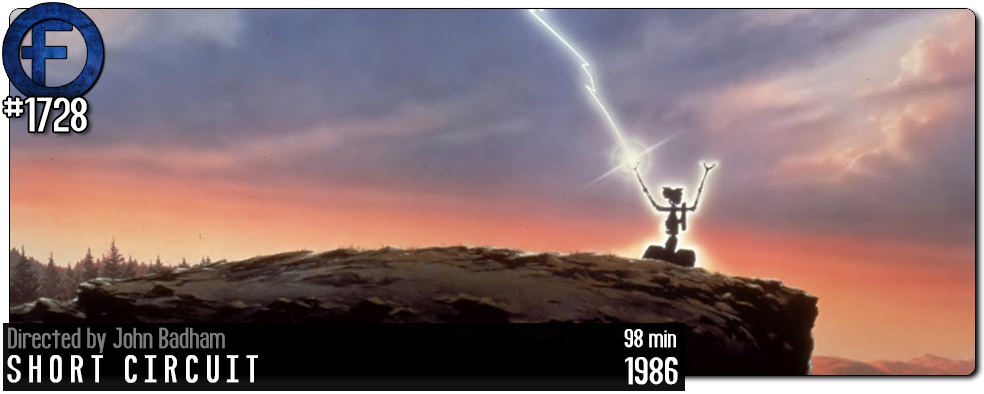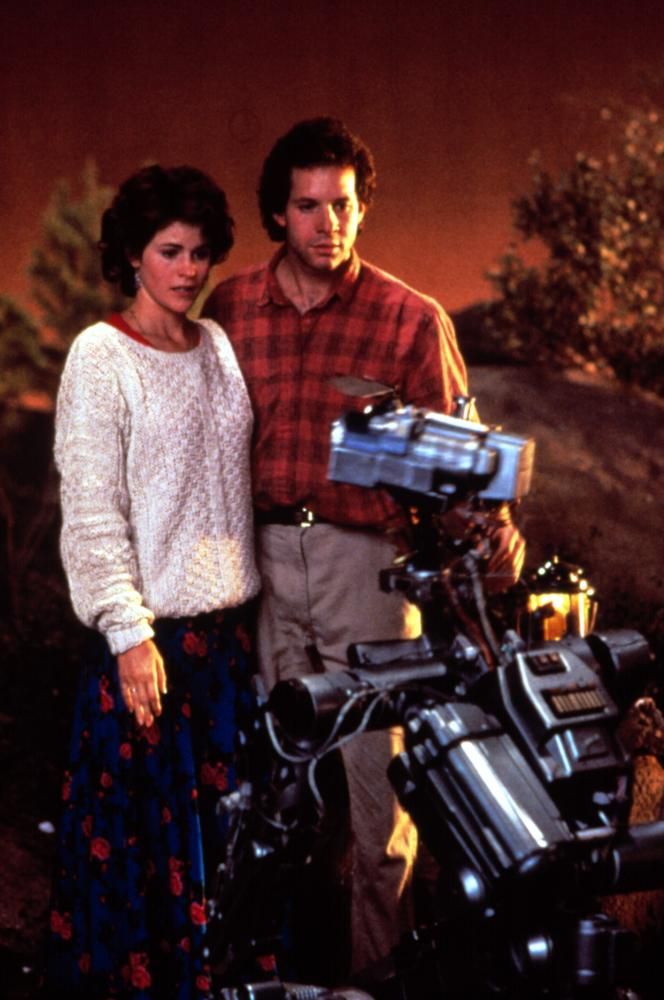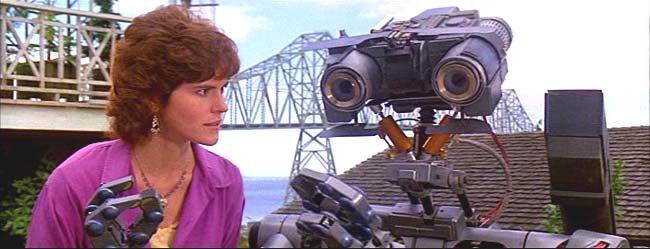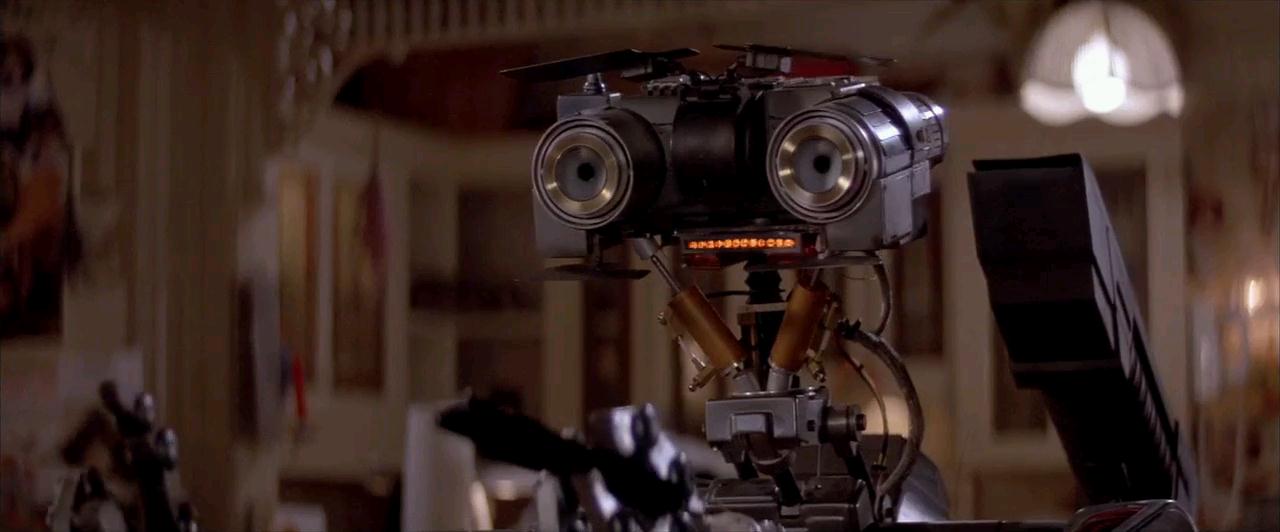Movie Review – Short Circuit

Principal Cast : Steve Guttenberg, Ally Sheedy, Tim Blaney (Voice), Fisher Stevens, Austin Pendleton, GW Bailey, Brian McNamara, Marvin J McIntyre, Penny Stanton, Vernon Weddle, Barbara Tarbuck.
Synopsis: When one of five highly advanced robots in a laboratory is accidentally struck by a lightning power surge, he gains sentience, escapes, and befriends a woman who runs a local animal shelter.
********
This seminal 80’s techno-comedy has lost none of its charm or sentimentalism in the years since; nostalgia blossoms hard for Short Circuit, the endlessly quotable kiddie-flick that delivers quirky robotic effects (as well as an awfully racist caricature that nearly, very nearly, sinks this film entirely) and a watchable Steve Guttenberg performance, remaining one of the more intangibly memorable films of its vintage still doing the rounds today.

In the Oregonian countryside, robotics laboratory NOVA has built five technically landmark (and expensive) robots the military intends to use to send into battle as a far safer and quicker way to end conflict. Developed by Newton Crosby (Guttenberg) and programmer Ben Jabituya (Fisher Stevens), the five robots have inbuilt lasers and a powerful destructive capability. After a demonstration for the excited military, one of the robots is hit by a power surge caused by a lightning strike, causing the machine to gain sentience and strike off on an escape. Number 5 (voiced by Tim Blaney) meets enthusiastic animal welfare advocate and fast-food purveyor Stephanie Speck (Ally Sheedy), who he convinces to provide “input” (ie, books and information), before they are both sent on the run by the pursuing forces of NOVA, led by the persnickety Captain Skroeder, and NOVA’s President Howard Marner (Austin Pendleton). With a disbelieving Crosby also on the hunt, the newly alive Number 5 must use all his wits and cunning to stop them turning him off for disassembly.

Utter the words “Johnny Five is alive!” or “No disassemble” to anyone over the age of about thirty and you can watch their eyes glaze over with that loving look of nostalgia for a youth spent dreaming of owning their own sentient robot. John Badham’s Short Circuit came along in the mid-1980’s, at the height of the computer/robotics craze and around the same time as nascent arcade games like Pac-Man and Space Invaders had captured the imagination of kids across the globe. Following on from more sinister sci-fi efforts such as War Games (also directed by Badham, in 1983), RoboCop, and even television series Knight Rider built upon our fascination with technology, and how its purposes could be used for both good and evil; where Short Circuit went somewhere unique was in proposing the idea that an initially robotic construct could somehow be “born” into self-sufficient intelligence, and do so in a way that might make the intended younger audience ask some pretty serious questions.

While superficially it’s technological outlook and overall aesthetic has dated severely in the years since 1986, Short Circuit’s charm, small-town Americana vibe and the central character’s sheer enthusiastic personality will still win over even the most jaded younger viewers. Number 5 (or, as he’s better known, Johnny 5) is a surprisingly junkyard-dog design brought to wonderful, vivid life by puppeteer and voice-actor Tim Blaney (you may know he also voiced Frank The Pug in the Men In Black movies, among other projects), with his clattering limbs, roller-derby caterpillar track base and expressive, impossibly humanoid-but-not-in-the-slightest face. The design of the robots are clunky and lack elegance, a derivative feature of 80’s technological futurism in some respects, but somehow it just works. Number 5’s facial structures, from his glowing red eyes to his butterfly-styled “eyebrows” and Blaney’s subversive skills in inhabiting the robot’s “life” (Blaney wore a specially crafted suit that would allow the robot to mirror his actions on set, as well as recording his voiceover, allowing for a more responsive and natural effect on-camera) offer startlingly cool practical effects work that still holds up. Whereas sentient robotic organisms have become passe in modern sci-fi, Short Circuit strips back the elegance and subtlety of such an idea and hones it down for a more child-friendly examination.

It’s here that the screenplay delivers. Screenwriting duo SS Wilson and Brent Maddock (the Tremors franchise, Short Circuit 2, Batteries Not Included, Wild Wild West) give us characters that are easily accessible to younger viewers while tackling (or at least asking) the big questions: what is “life”, can a robot ever come to life, and what happens when Steve Guttenberg plays an actually likeable part. For his part, Guttenberg may have the star billing but he’s easily second fiddle to both the robot and Ally Sheedy’s Stephanie, with his nerdy computer developer shtick parlaying all the big-screen geek tropes into a single, distilled cliche of nervousness around girls and a predisposition for cowardice and conformance. His sidekick, a ghastly Indian stereotype played by a gibbering Fisher Stevens (oh man, I just remembered that Stevens had the lead human role in Short Circuit 2, a film my kids have been begging to see…. ahhhh) in a “blackface” of sorts, is a character designed purely as comic relief in a film that simply doesn’t need it – Stevens’ Ben Jabituya absolutely mangles the English language (seriously, this guy can programme a computer but doesn’t understand basic phonics?) – and if there’s any single aspect to the film that hasn’t aged poorly, this is it. It’s on par with Mickey Rooney’s awful Asian caricature from Breakfast At Tiffanys.

The wonderful Austin Pendleton plays Guttenberg’s boss and supreme ruler of NOVA, where the robot escapes from, and Guttenberg’s Police Academy chum GW Bailey delivers mild threat as Captain Skroeder, who seems to hate technology (why work at a robotics lab then?) and hate robots even more (he’s got such a boner for destroying Number 5, it becomes almost too juvenile even for this film), and the sense of manic escapism Badham brings to the film’s second half is an outright blast. One thing I noticed as an adult re-watching this for the first time in several decades is that Skroeder is pronounced an awful lot like scrotum – scroter, if you will – that I nearly wet my pants chortling the first time I heard it again. So apropos.

And of course there’s Ally Sheedy, Badham’s 80’s muse and focus of much of Short Circuit’s humanising of Number 5. As Stephanie, she personifies all that’s good and right with the world, and provides the film with an audience connection. Sheedy gamely goes for broke in working alongside the robot solo for a lot of the film’s early going, and a small dance number she has with the machine (a sly in-joke referencing Badham’s monster 70’s box office success in Saturday Night Fever) is sweet but not overplayed. There’s an honesty to Sheedy’s work here, and the film seems to charge up whenever she’s on the screen. Referencing comedy like the Three Stooges and other popular culture mores (such as gangster movies and good ol’ John Wayne) is an easy way of giving Number 5 a childlike innocence amidst the ongoing violence of his pursuers, and it also provides the film’s sentience subtext with more gravitas given our attachment to such things, and both Sheedy and Blaney (and to a lesser degree Guttenberg) seem to get that in making the connection between Stephanie and Number 5 as honest as possible, it gives the audience an investment that works when the film’s gut-wrenching final act comes along.

With its delightful sense of 80’s old-school practical effects and a heartwarming bunch of characters, there’s few films that can stand up to the scrutiny of modern eyes as well as Short Circuit. The technology may have dated in many respects, and it feels somewhat cheesy in parts, but the work on Number 5 and the beauty in his inelegance and Badham’s indulgence with the character remains as pure and unfettered by time’s passage as ever. If your kids aren’t wandering the house screaming “INPUT!” or “Number 5 is alive!” after watching this then they may be robots themselves. Affecting, effectively told, and altogether still a delightful robotic charmer (despite its aforementioned racially heinous caveat), Short Circuit comes definitely recommended for the entire family.

